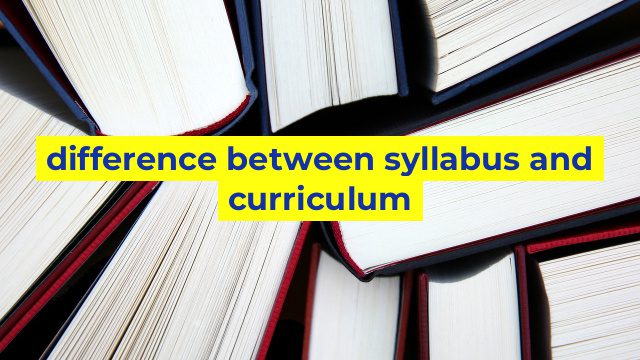The Difference Between Syllabus and Curriculum: Understanding the Key Elements
For every educational institution or course, the syllabus and curriculum are two important elements that need to be carefully created and followed. While these two terms are often used interchangeably, they represent two separate aspects of an educational program. It’s imperative for students, teachers, and administrators to understand the difference between syllabus and curriculum to ensure a more effective and efficient learning experience.
What is Syllabus?
A syllabus is a document that provides a comprehensive outline of a specific course or program. It’s a detailed summary of the topics covered, the goals and objectives, the learning outcomes expected, the required reading materials, grading criteria, schedule of classes, and other essential information that students need to know in order to succeed in the course.
A syllabus is typically created by the instructor or professor of the course, and it’s important for them to ensure that it is clearly communicated and adhered to throughout the duration of the course. It serves as a roadmap that helps students stay on track and focused, provides them with a clear understanding of what is expected of them, and sets them up for success.
What is Curriculum?
Curriculum, on the other hand, is a broader term that encompasses all of the educational programs and activities offered by an institution at a particular level of study. It’s a comprehensive plan that outlines the goals, objectives, content, and methods of instruction for all courses and programs offered at an institution.
In other words, while syllabus is course-specific, curriculum is all-encompassing, covering all the courses and programs offered by an institution. A curriculum is usually developed by a team of educators, and it takes into account various factors such as institutional goals, student needs, societal demands, and other factors that contribute to the overall educational experience.
The Differences Between Syllabus and Curriculum
The key differences between syllabus and curriculum are:
– Syllabus is specific to a particular course, while curriculum encompasses all the courses and programs offered by an institution.
– Syllabus is created by instructors or professors, while curriculum is developed by a team of educators.
– Syllabus outlines the specific topics, readings, and grading criteria for the course, while curriculum outlines the overall goals, objectives, and methods of instruction for all courses and programs offered.
– Syllabus is tailored to the needs and goals of a particular group of students, while curriculum considers the broader needs and goals of all students at an institution.
In conclusion, understanding the difference between syllabus and curriculum is crucial in ensuring an effective and efficient educational experience for both students and instructors. Both elements are important and complement each other in providing a comprehensive education. By following both the syllabus and the curriculum, students can be assured of a well-rounded educational experience that prepares them for success in their chosen field.
Table difference between syllabus and curriculum
| Syllabus | Curriculum |
|---|---|
| Provides an outline of the topics to be covered in a specific course | Includes all the courses, programs, and activities that a school or institution offers |
| Specifies the learning objectives, goals, and expectations for a particular course | Defines the overall educational goals, learning outcomes, and standards of a school or institution |
| Can be modified or updated by individual teachers or departments to suit their teaching style or student needs | Is approved by the school or institution’s board or administration and is more difficult to modify or change |
| Focuses on the content and topics that will be covered in a specific course | Looks at the holistic education of students and how different courses and activities connect to each other |
| Is more specific and detailed, often outlining specific readings, assignments, and assessments | Is more general and broad, providing a framework for learning but not always specifying exact assignments or activities |
